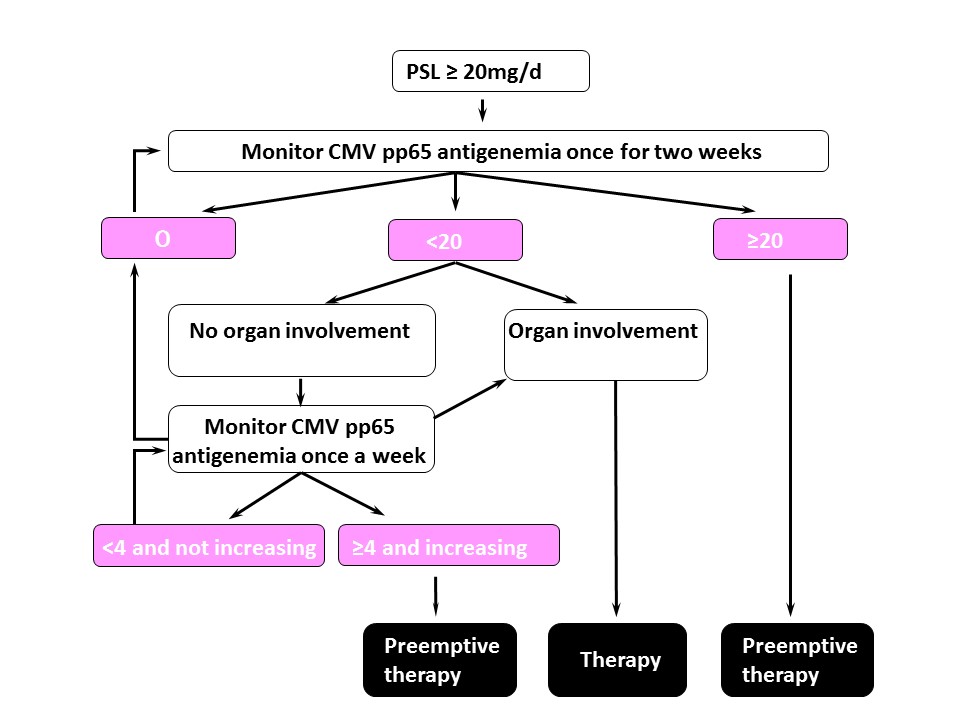Session Information
Session Type: ACR Poster Session A
Session Time: 9:00AM-11:00AM
Background/Purpose: Cytomegalovirus (CMV) infection is a life-threatening complication in immunocompromized hosts. There are no official guidelines for CMV infection management in patients with connective-tissue diseases (CTD) under immunosuppressive therapy. CMV infection management according to the guidelines of the Japan Society for Hematopoietic Cell Transplantation (JSHCT) 2011 was performed in CTD patients and its usefulness and safety were evaluated.
Methods: We retrospectively examined 98 CTD patients who were admitted to the National Defense Medical College Hospital from October 2012 to March 2017, and were receiving ≥20 mg/day of prednisolone. CMV infection was defined by the detection of CMV pp65 antigenemia. CMV disease was diagnosed by both detection of CMV pp65 antigenemia and the involvement of organs due to CMV reactivation. We managed the CMV infection according to the guidelines. The primary endpoint was mortality and major organ involvement due to CMV infection. We also evaluated the risk factors for CMV reactivation and intervention after scoring positive for CMV antigenemia.
Results: Sixty-six cases of positive CMV pp65 antigenemia occurred in the 98 patients. An antiviral drug was administered in accordance with the JSHCT guidelines in 36 cases (treatment group). The patients in the remaining 30 cases did not receive treatment (observation group). No patients died due to CMV disease. Four patients in the treatment group died due to renal failure, Pneumocystis pneumonia or deterioration of adult-onset Stillfs Disease, in observation group none died. Persistent major organ involvement due to CMV infection did not occur in either groups. The risk factors for CMV reactivation were older age and steroid pulse therapy. The risk factor for CMV disease was CMV test positivity in the early period (<4 weeks) of steroid therapy. Thrombocytopenia is the most common manifestation of CMV disease.
Conclusion: This study demonstrates the usefulness of CMV infection management according to the JSHCT guidelines for CTD patients under immunosuppressive therapy.
To cite this abstract in AMA style:
Suzuki R, Kusanagi Y, Nakanishi T, Horikoshi H, Kimura F, Itoh K. the Usefulness of Cytomegalovirus Infection Strategy in Patients with Connective-Tissue Disease, Based on the Guidelines of the Japan Society for Hematopoietic Cell Transplantation 2011 [abstract]. Arthritis Rheumatol. 2017; 69 (suppl 10). https://acrabstracts.org/abstract/the-usefulness-of-cytomegalovirus-infection-strategy-in-patients-with-connective-tissue-disease-based-on-the-guidelines-of-the-japan-society-for-hematopoietic-cell-transplantation-2011/. Accessed .« Back to 2017 ACR/ARHP Annual Meeting
ACR Meeting Abstracts - https://acrabstracts.org/abstract/the-usefulness-of-cytomegalovirus-infection-strategy-in-patients-with-connective-tissue-disease-based-on-the-guidelines-of-the-japan-society-for-hematopoietic-cell-transplantation-2011/

